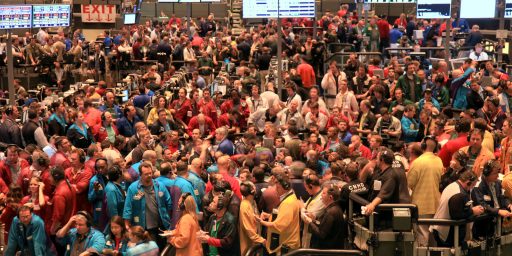The Great Depression of 1982
Alex Tabarrok has a post on the Intrade markets depression contract which indicates that it really isn’t a contract for a depression. Here is the key clause from the contract,
For expiry purposes a depression is defined as a cumulative decline in GDP of more than 10.0% over four consecutive quarters. This is calculated by adding together the published (annualized) GDP figures (as detailed below). If these annualised figures add up to more than -10.0% over four consecutive quarters then the contract will expire at 100.
Alex points to this explanation from Donald Luskin of why this doesn’t quite signal a depression,
The problem is that if you add four quarterly change-figures that are already each annualized, you will get a far larger cumulative result than the actual change over a four-quarter period. Suppose there are four successive quarters each showing an annualized 2.5% decline in GPD. Intrade will add those together and get 10%. But over the year, the annual decline in GDP will acually be 2.5%.
That is quite right. During the Great Depression GDP declined by 8.6% in 1930, 6.4% in 1931 and 13% in 1932. Far larger drops in GDP than 2.5%. Of course, a 2.5% drop in GDP over the course of an entire year would make such a recession a bad recession. Of course, we don’t need 2.5% each quarter for 4 quarters. In the last quarter of 1981, and the first three quarters of 1982 the annualized changes in GDP were -4.9%, -6.4%, 2.2% and -1.5%. Those sum up to -10.6% using the Intrade method whereas actual decline in real GDP over that time was 1.49%.1 So even though the intrade contract is up to 59% it doesn’t mean we are going to see the kind of GDP declines one might normally associate with a depression.
_____
1All data on GDP comes from NIPA tables 1.1.1 and 1.1.3.




The Depression didn’t happen overnight. This is just the beginning. Here’s Ben Bernanke analyzing the Depression and saying that the Fed caused it and “We’re Sorry”.
It appears that they are running their experiment differently this time around.